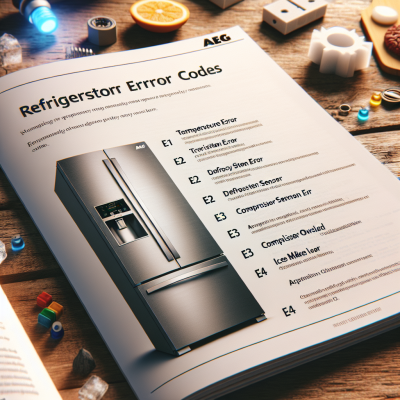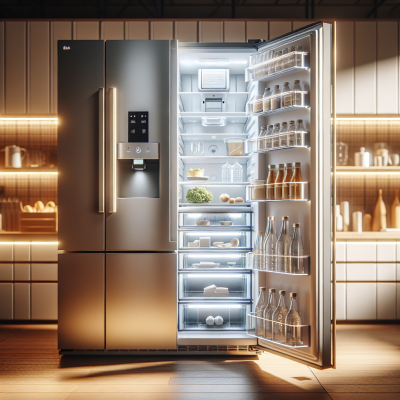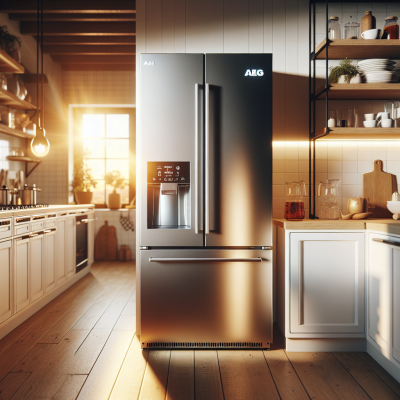Fast & Reliable Crosley Refrigerator Repairs - Call Now! |
Troubleshooting
Refrigerator Not Cooling
One of the primary functions of your refrigerator is to maintain the appropriate temperature to keep your food fresh and safe. If your refrigerator is not cooling, consider the following potential causes and solutions:
-
Power Issues: Ensure the refrigerator is plugged in and receiving power. Check if the outlet is functional by testing with another appliance.
-
Thermostat Settings: Ensure the temperature settings have not been accidentally adjusted. The ideal temperature for the refrigerator compartment is around 37°F (3°C).
-
Blocked Vents: Check for any obstructions in the vents that might impede air circulation.
-
Condenser Coils: Dusty or dirty condenser coils can affect cooling efficiency. Clean them regularly with a vacuum or a brush.
-
Door Seals: Inspect the door seals (gaskets) for any damage or gaps that might be causing cooling loss.
Freezer Issues
Freezers play a critical role in preserving perishable food, so it's important to address any issues promptly:
-
Frost Buildup: Excessive frost can limit airflow and reduce efficiency. Conduct proper defrosting as needed.
-
Freezer Temperature: Ensure the freezer temperature is set correctly, ideally at 0°F (-18°C).
-
Overloading: Avoid overfilling the freezer, as this can restrict airflow and cause uneven cooling.
-
Ice Buildup on Evaporator Coils: A buildup of ice on these coils can signal a defrost system malfunction and may necessitate professional servicing.
Water Dispenser Problems
If your refrigerator’s water dispenser is experiencing issues, try these troubleshooting steps:
-
Water Supply: Verify that the water supply valve is open and supplying water to the dispenser.
-
Filter Issues: A clogged water filter can impede flow. Change filters according to the manufacturer’s guidelines, typically every six months.
-
Airlocks: Eliminate air from the system by drawing out water for a full minute or two.
-
Frozen Water Line: Check if the water lines have frozen; this often entails adjusting freezer settings or aiming for thawing.
Ice Maker Malfunctions
Ice makers can sometimes see a disruption in production or quality of ice. Here are common issues and fixes:
-
Water Supply: Ensure the ice maker is connected to a functional water line.
-
Ice Jam: Clear away any visible ice blockages that might be preventing proper operation.
-
Filter Replacement: Regularly replace the water filter, as a clogged filter can affect ice production.
-
Control Arm or Sensor Issues: Check that control arms or sensors, which manage ice production, are not stuck or malfunctioning.
Strange Noises or Vibrations
Unusual sounds from your refrigerator can be unsettling. Take these steps to identify and mitigate:
-
Leveling: Confirm that the refrigerator is level to avoid vibrations.
-
Internal Fans: Listen for consistent operation of internal fans, which, if noisy or stopped, might require professional review.
-
Compressor Sounds: Slight humming from the compressor is normal, but loud or unusual noises may indicate an issue.
Odor Issues
Unpleasant smells can emanate from the refrigerator due to various reasons:
-
Expired or Spoiled Produce: Regularly discard old food items.
-
Cleaning: Clean spills immediately and wipe down surfaces with a mild detergent regularly.
-
Odor Absorbers: Consider using baking soda or activated charcoal to absorb odors.
Light Not Working
The interior light not functioning can be caused by simple to more complex issues:
-
Bulb Replacement: Check and replace the bulb if burned out.
-
Door Switch: Ensure the door switch, which triggers the light to turn on, functions properly.
-
Power Concerns: Ensure there are no general electrical issues affecting the light operation.
Door Seal Problems
Well-functioning door seals are critical for maintaining ideal cooling efficiencies. If you encounter problems:
-
Seal Inspection: Conduct regular inspections for wear or damage.
-
Cleaning: Clean the seals regularly to keep them from becoming brittle and to enhance sealing efficiency.
-
Replacement: If seals are damaged beyond simple repair, plan for replacements to prevent cooling loss.
Each issue mentioned is paired with simple steps to resolve or mitigate the problem. However, when major malfunctions or any uncertainties arise, seek professional service to avoid worsening the issue or voiding warranties.




